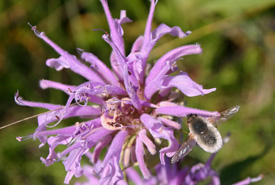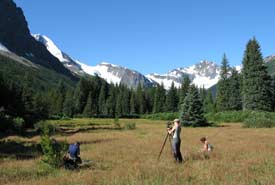NCC staff’s small acts of conservation

Wild bergamot being visited by a bee fly (Photo by Diana Bizecki Robson)
When it comes to nature conservation, a little can go a long way. Small-scale conservation efforts can have a huge impact and help ensure that we and future generations can enjoy our precious natural spaces.
This spring, the Nature Conservancy of Canada (NCC) invites you to join Canadians coast to coast in making a big impact for nature by taking part in our Small Acts of Conservation challenge.
NCC staff from across the country are joining in on the fun by sharing their small acts and what they do to help conservation. Get inspired to act below:
British Columbia
"After spotting an Anna’s hummingbird nest on a Garry oak in my backyard, I installed a hummingbird feeder nearby. Feeders can greatly improve the chances of survival for these non-migratory hummingbirds and can be crucial during cold winters. Just be sure to keep the sugar water from freezing!" ~Travis Muir, conservation and engagement coordinator
"I’m planting Garry oak trees, gathered from the nursery at NCC’s Cowichan Garry Oak Preserve, in my front yard and attempting to re-wild the surrounding landscape at my house with plants associated with the Garry oak ecosystem. With the removal of grass and lawn, though, I hope the neighbours will be happy! My goal is to create a small ecosystem, complete with an interpretive panel, so that people walking by can become more familiar and comfortable with the role of natural ecosystems in an urban environment. We have a lot of urban deer in our neighbourhood, which makes any gardening a challenge"! ~Linda Hannah, regional vice-president
Alberta
"I like to bike to work when the weather permits. Not only does it give me a chance to get some sunshine and fresh air on my commute, but I don’t have to waste my time sitting in bumper-to-bumper traffic!
I make the best of my small outdoor space at home by growing native flowers in my deck planters to attract native pollinators. I also leave out a little bee bath: a shallow bowl with some pebbles for bees to land on so they have somewhere to drink. In the summer I refill it every day with fresh water." ~Carys Richards, communications coordinator
Saskatchewan
"I’m digging out my lawn a bit at a time and replacing it with native prairie flowers, including bergamot, gallardia, giant hyssop, prairie smoke and goldenrod." ~Jennifer McKillop, director of conservation
"My small act of conservation this summer will be to plant milkweed for monarch butterflies, which are declining. I also plan to plant other native flowers to benefit pollinators in general, as well as put up a bee house for solitary bees." ~Sarah Ludlow, conservation science and GIS coordinator
"At Old Man on His Back (OMB), a large portion of the livestock management is done on horseback instead of using ATVS and quads in the summer months. At a past Conservation Volunteers event, NCC staff, with the help of Conservation Volunteers, planted a native plant garden in front of the Interpretive Centre to be used as an educational tool. The majority of our monitoring across the province is done on foot. No fossil fuels are used or emissions created, leaving a very small “footprint” on the landscape. Also, it’s a great workout!" ~Natalie Hassett, natural area manager
"We are a one-car family, and live fairly close to where we work and play. We try to bike or walk whenever we can. And we don’t buy bottled water." ~Verity Moore-Wright, senior development officer
"I bike to work in the summer, 29 kilometres round-trip. My favourite part is biking along the Meewasin Trail and spotting American white pelicans gathered by the Saskatoon weir to fish in the South Saskatchewan River." ~Daphne May, communications manager
Manitoba
"I signed up to receive all of my standard billing electronically, to reduce paper use. Also, I decline flyers delivered to my house to reduce the amount of recycling and waste materials going to our local facilities." ~Josh Dillabough, natural area coordinator
"I share my love and appreciation for nature through songwriting, photography and educating others, with the hopes that they will connect others more deeply to their surroundings and promote the inherent value of the natural world." ~Carly Dow, LIS coordinator
Ontario
"Every year, I choose a new native plant to add to my garden in Toronto. It’s something fun that I can do with my kids, and also brings me a lot of joy throughout the season to see how the plant grows and develops." ~Dana Kleniewski, director of development
"As soon as the snow is off the ground (and skiing lessons are over), I set a goal with my kids to get out for a hike every other weekend. My six-year-old twins and I head off to parts unknown or known (sometimes a small urban hike in the city, sometimes a greenbelt walk, sometimes an NCC property) and we talk about nature, birds, trees and getting outside. It’s important to me that my kids grow up valuing nature and don’t just take it for granted. These small actions can, I believe, add up to a big belief. This year for Christmas, my daughter asked for a book on how to draw trees, so it might be working." ~Jill Murray-Dimic, manager of major gifts
"I finally signed up for e-bird [app] and have a goal of trying to spend a few minutes birding from my office window when I work from home. Also at my home, my partner and I started composting in the backyard when we moved here last year, and we hopefully will be able to use homemade compost in our garden this spring. We also use gravel/sand instead of salt in the winter, partly because road salt is toxic for dogs and our beagle's paws are super sensitive to it, but also to not contribute to the toxic salty runoff that enters our waterways each spring." ~Pia Kaukoranta, development officer
"I came across a patch of dog-strangling vine in my backyard last summer, threatening to take over the garden and spread to my unsuspecting neighbours’ lawns. I took the advice of my NCC colleagues and cut off the seed pods before they had the chance to open and spread like crazy! As soon as the ground thaws this year, I’ll be back there digging it out." ~Laura Vaughan, development officer
National
"To minimize our impact and to be more environmentally conscient, my partner and I decided to start buying second-hand gifts for each other for birthdays, anniversaries, etc. Both avid thrifters, we enjoy hunting through second-hand shops for treasures, such as vintage clothing, knick-knacks and unique housewares. By opting for gifting this way, we’re reducing our waste. Instead, the gift is the time spent looking for something we know the other person will love." ~Raechel Bonomo, content creator/staff writer
Quebec
"The green committee at the Montreal office has implemented several small acts for nature. Cotton towels have replaced brown paper, and biodegradable soap is now purchased in bulk for the bathrooms. Staff heading out to a restaurant for lunch can grab a container from the office kitchen to put their takeout in, reducing food packaging. Bottled water is no longer used during meetings and volunteer activities; instead, we use glass jugs and glasses. Vermicomposting has been put in place, which has greatly reduced organic waste. Finally, with spring arriving soon, we’ll have a seed exchange between staff in the office." ~Quebec staff, Montreal office
New Brunswick
"Many of the birds we are working to protect in New Brunswick are threatened by coffee plantations in central and South America. I brew organic, bird-friendly (and fair trade) coffee in a French press here at the office (like several of my NCC colleagues). Also I collect everyone’s coffee grinds and other organics and bring it home to my compost pile." ~Paula Noël, program director
"As the snow starts to melt, all the disgusting litter buried underneath is revealed. To help clean it up, when my girlfriend, Kendra, and I walk our dog, we take a shopping bag with us and pick up trash along the sidewalks and walking trails (which easily fills up within five to 10 minutes)." ~William Millar, aquatic conservation planner
Nova Scotia
"I walk three kilometres round-trip to and from work most days. And when I don’t feel like walking, I take transit. At the moment, I’m trying to get away from using plastic bags — especially single-use bags like the ones in the grocery store for produce. Some produce I just wash when I get home and at other times, I try to use the paper bags used for mushrooms. I was recently given reusable/washable produce bags, but I have to work on remembering to stash those in my reusable grocery bag to bring with me on my next trip to the grocery store." ~Danielle Horne, stewardship assistant
Newfoundland and Labrador
"I use public transportation instead of driving. In August 2017, my car broke down, and I challenged myself to go two months without one. Eight months later, I haven’t looked back! I feel fortunate that my lifestyle right now allows me to embrace this change, including a three-kilometre walk to and from work each day." ~Julia Lawler, stewardship assistant


